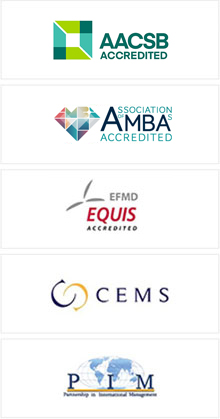Digitalisation will thoroughly challenge our whole society
Global business will be possible on an unprecedented scale.

Digitalisation will change the Finnish society in many ways. It will wipe out some of the traditional operations and practices, but will at the same time offer new opportunities for new business activities and the development of society. It is up to us to choose which way we go. By reforming old practices and making bold investments in the future, we can be among the winners in digitalisation. The right kind of expertise, low level of corruption and good IT infrastructure provide Finland with the prerequisites to be among the winners.
Professors of Practice at Aalto University School of Business Katariina Kemppainen (Logistics), Olli-Pekka Lumijärvi (Accounting), Hannu Ojala (Accounting), Erkki Ormala (Innovation Management) and Liisa Välikangas (Innovation Management) have drawn up the following statement, in which they highlight opportunities provided by digitalisation that our society should take advantage of.
The sharing economy will replace centralised production. Digitalisation has enabled the sharing economy in which resources are used more efficiently. There are numerous examples: A home that is not occupied can be rented out for a short time through Airbnb. Individual car owners can make their cars available for rental through the Turo service and drivers who are departing on a flight can rent their cars out using the FlightCar service instead of leaving the car unused in the car park for the duration of their trip. At the same time, business that does not tie up capital is created. Airbnb works like a hotel chain but does not own any flats. Uber and Luft do not own the cars, nor are the drivers employed by them. This kind of business model would be excellent in a capital-scarce country like Finland.
The Internet of Energy decreases need for big investments. Digitalisation could help decrease greenhouse gas emissions by dozens of percentages. The United Stated invests hundreds of millions in creating an Internet of Energy, in which anyone can be a producer and consumer of energy. The supply and billing of energy could be carried out through a shared digital platform in the same way as the transmission and billing of information on the internet.
Services will form an essential part of the offering of industry. We live in a post-industrial society based on services. Basic industry is rapidly modernising its operating practices. Many Finnish engineering firms are moving on to the era of the Industrial Internet, in which growth is sought in services that monitor the functioning and condition of equipment in real time. In those circumstances, building national digital service platforms is at least as important as it is to improve the national transport infrastructure.
The flows of information in economy will be simplified. The EU follows the United States’ example of reducing the private sector’s obligations to produce economic information, determining them largely as an ‘administrative burden’. The production of economic information by communities important from the point of view of public interest is increasingly regulated and monitored due to worries about systemic risks. The flows of information in economy in the private as well as the public sector will become more structural (e.g. XBRL) and more usable.
Universities will be challenged by global competition in education. Finland wants to be the leading country of inspiring learning, but there is room for improvement especially in studies in higher education. The best universities in the world provide high-quality learning opportunities aiming at conquering the global markets and recruiting the best students. Young people, tired of mass lectures and used to studying online, may vote with their feet. Along with digitalisation, they do not even need to move abroad to do this.
Work will change. In future, few will enjoy the privilege of established employment relationships. Companies such as eLance, 99Design, Uber and Wolt provide work for millions of people all over the world. In those circumstances, it is a hopelessly outdated practice to make a distinction between an employee and an entrepreneur. In Britain, for example, a person can be employed and self-employed at the same time.
Taxation models must be updated. When the ongoing transformations in the field of media, in the retail industry and healthcare services are taken into account, the tax base will change even more. The state coffers cannot be filled by taxing traditional work. New taxation models are needed so that the effects of digitalisation on income formation and consumer behaviour can be taken into account. Sustainable sources of growth may include the selling of digital services in international markets and environmental taxation.
Digitality will thoroughly challenge our society, including the structures and practices that were agreed a long time ago. We are living in times of unforeseeable changes. The Silicon Valley is not getting tired of talking about these discontinuities changing the rules. Is Finland going to fall behind voluntarily?
The Professor of Practice (PoP) network, established at the Aalto University School of Business in the autumn of 2015, convenes about four times a year to discuss current multidisciplinary topics. In addition to the professors mentioned in connection with the statement, professors Esko Penttinen (Information Systems Science) and Paul Viio (Selling and Sales Management) are also members of the network.
The position of Professor of Practice provides an opportunity to transfer practical societal knowledge to the university community. People recruited to the position of Professor of Practice are experts of business life or the public sector working in fields important for Aalto University. Their central role is to open and develop new areas in teaching and/or research or artistic work.



